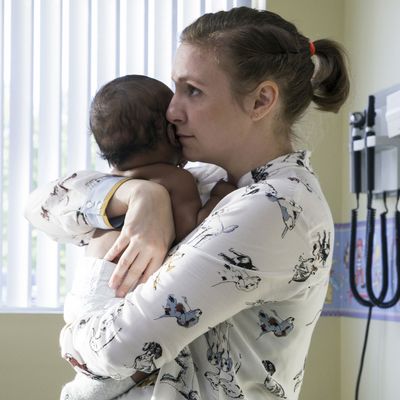
In the final episode of HBO’s Girls, Hannah Horvath and her mother, Loreen, get into an argument. It’s not the same argument they had in the very first episode of this now concluded series, when Loreen said she would no longer provide Hannah with financial support. But in a way, it is. Several years later, Loreen is still trying to make her daughter realize that she needs to take responsibility for herself, and, now that she’s a mother, for the obligations that come with raising her newborn son.
“I don’t understand why you’re yelling at me while I’m in emotional pain,” Hannah says, not quite whining but definitely steering toward it as her mother tears into her.
“You know who else is in emotional pain?” Loreen asks.
Hannah: “Who?”
Loreen: “Fucking everyone! For their whole lives!”
This is one of those Girls moments that people may be inclined to cite as an example of how the show skewered millennials, those allegedly fragile creatures who, like Hannah, disintegrate when every ball in life fails to land right in their strike zones. But it’s also a scene in which a parent is just trying to knock some sense into a child who is inclined to throw punches and blame right back. (When Loreen asks if the last few years of being a mother have looked easy to Hannah, Hannah coldly responds, “Maybe they would if you’d chosen a husband who wasn’t gay and who actually loved you. Then I would know what an actual functional family looked like and I wouldn’t be up here with Marnie acting like that was normal.” Good lord, Hannah.)
As atypical of Girls as last night’s finale may have felt — we were not only well outside of Brooklyn in this one, but also stripped down to just three familiar faces, with a baby named Grover and extensive talk of breast feeding added to the mix — that scene and the themes the episode addressed were very much in keeping with the show’s narrative approach.
Girls may always be remembered for capturing the 20-something experience — or at least, the 20-something experience for a very specific slice of that demographic’s population — during the 2010s. And honestly, it should be remembered for that. This was a show about women in their immediate post-college years trying to get by in the very specific New York of the Obama era: one where a lot of young people had migrated to Brooklyn; a creakily recovering economy made unpaid internships and reliance on financial support from parents the norm; and reputations as well as careers were built using digital tools, like Twitter and e-books.
What tends to get lost when we talk about Girls is the notion that the series was also a simple coming-of-age story about one woman’s long, still incomplete journey toward realizing that the world is bigger than she is, which is unlike other coming-of-age stories. While it may not have captured the complete breadth and diversity of its generation or of New York, it dealt with a variety of classic issues — relationship problems, career uncertainty, friendships that become fragile even though they once appeared to have been built out of bedrock — for a group of people that, over time, extended beyond Hannah. The concerns of characters like Elijah, Ray, or Loreen and Tad, Hannah’s parents, were explored more closely as the seasons progressed in a way that reflects how one’s world view widens slowly — very slowly if you’re Hannah or Marnie — when a young adult transitions into an actual adult.


